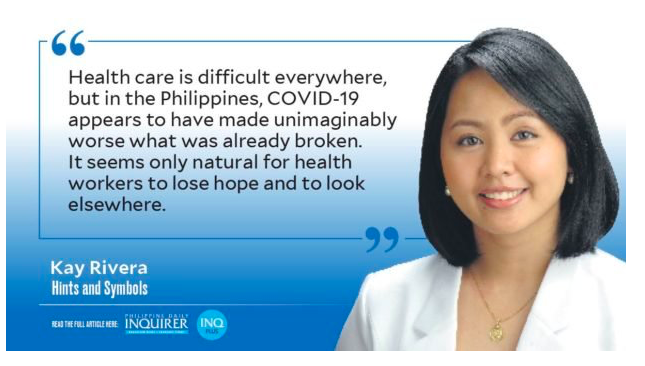Greener pastures
“Have you guys ever thought of just leaving?” A med school classmate asks. The question has been weighing on his mind. He is a young physician with a child. He is tired, both of the physical work of health care and the burden of living in a sociopolitical environment such as ours. He is not alone. This is a question often posed among ourselves. For some of us entertaining the idea is a mere flirtation. For an increasing number, the idea is swiftly becoming a real goal to search for greener pastures.
The shortage of health workers has led us to a crisis. In the last few weeks, hospitals have made it clear that capacities are limited not just because of beds or equipment, but also because of a shortage of trained staff. The shortage was there to begin with, and is now aggravated by staff resignations. Different associations put the estimate of resignations at 40 percent. Beds and machines can be donated, but we cannot conjure up the nurses, physicians, and allied staff equipped to handle the critical care needed for COVID-19 patients, as well as the demands of non-COVID care.
This is not, technically, a new problem. The Philippines remains one of the biggest suppliers of nursing staff in the world but our hospitals have long struggled with manpower shortages. From the perspective of a health care worker, this makes perfect sense. The plight of poor compensation for health workers has repeatedly been discussed by this column as well as other commentaries (including “Are we fair to our health care workers?”, Ernesto M. Pernia, 3/15/21). Things are even worse during the pandemic. The pittance of hazard pay notwithstanding, health care workers assume tremendous risks with little benefit. Any time they go on duty, despite maximal precautions, is a time that they risk exposing themselves and their loved ones to the virus. Even vaccinated health workers may contract (though to a lesser degree) and transmit COVID-19. Should a health care worker infect a yet unvaccinated member at home, the costs—of lives and money—can be catastrophic.
Hospitals have also complained that payments from PhilHealth, which can be used to maintain operations and pay staff, continue to be delayed, resulting in some institutions being unable to pay regular salaries, not to mention hazard pay. Why, indeed, would one settle for near-minimum wage when opportunities elsewhere, either abroad or outside of hospital work, pay better? I have had many friends seek nursing opportunities in Ireland and New Zealand. I understand them going where they are more valued.
Then there’s the exhaustion, both physical and mental. Obviously, health workers are tired, working as they do in a constantly high-stakes and high-stress environment. But the degree of burnout and physical tiredness is unprecedented. Also, with more and more resignations, the remaining staff are called to do even longer shifts and to continue to be on call. CNN recently interviewed Mississippi nurses talking about leaving their profession due to burnout and stress. One of them said: “It looks heroic… but that’s not what it is. It’s sweaty and hard and chaotic and bloody.” It truly does not help that with government run the way it is run, health workers pushed to the breaking point must witness the daily parade of our leaders’ empty promises, blatant corruption, nonsensical and unscientific public health policies, and people who are clearly just bad at their jobs, or too corrupted and self-absorbed to care about doing it well. Meanwhile, health workers must overlook their own best interests for the sake of public service. It is mentally exhausting.
Health care is difficult everywhere, but in the Philippines, COVID-19 appears to have made unimaginably worse what was already broken. It seems only natural for health workers to lose hope and to look elsewhere. My friend and I kid about moving to New Zealand. Life among the cows seems attractive, we joke, but we both know it’s more because we have mutual friends who live there and enjoy great compensation, healthy work environments, what appears to be a responsive and competent government, and good health care—not an ideal life, but immeasurably better.
We came into medicine at a time when the so-called brain drain led to the return of service agreements in different health-related degrees at certain state universities, by which service to the Philippines for a given period was mandatory after graduation. A lot of us signed those agreements thinking that we would continue to serve our country in the long term, so an agreement for a few years of service was inconsequential. We signed those also knowing that the health system was already so fractured, willing to serve anyway. Now, though, it’s getting harder and harder to convince my friend to stay where he is not valued, and where keeping our families safe and our children well-adapted seems like a near impossibility.
[email protected]
Disclaimer: The comments uploaded on this site do not necessarily represent or reflect the views of management and owner of Cebudailynews. We reserve the right to exclude comments that we deem to be inconsistent with our editorial standards.

